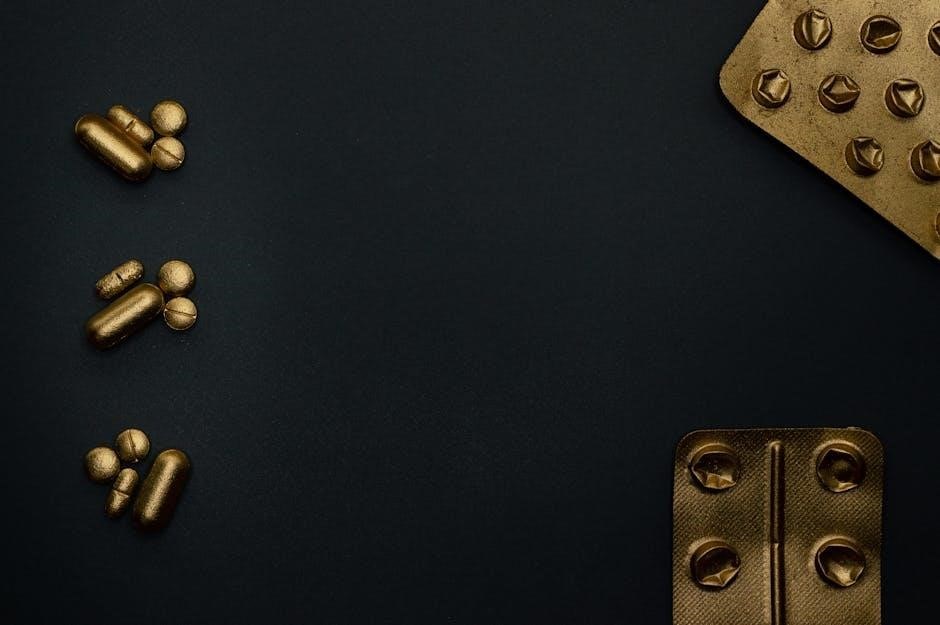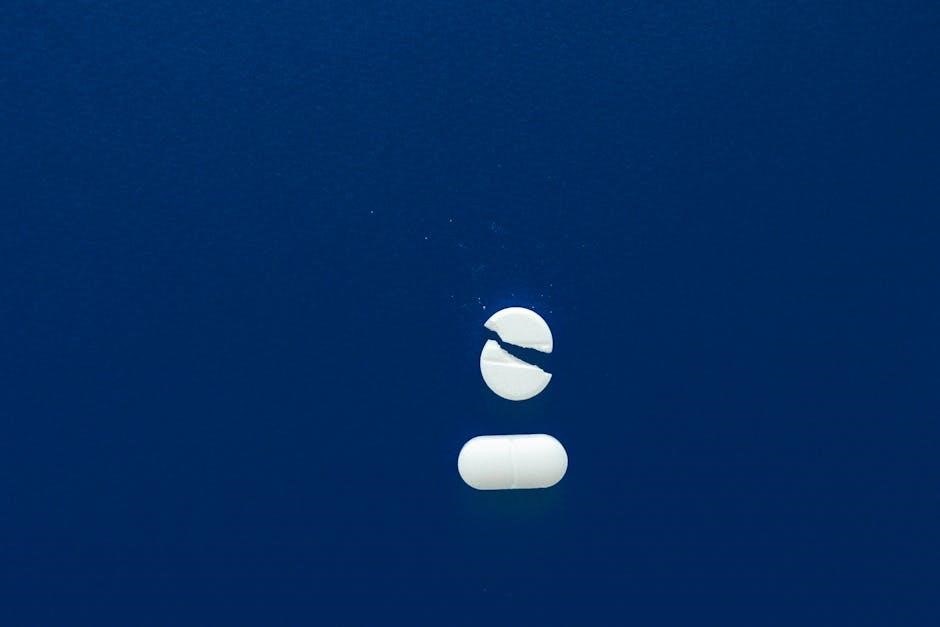
addiction treatment homework planner pdf
The Addiction Treatment Homework Planner PDF is a practical tool designed to support individuals in their recovery journey, providing a structured framework for setting goals, tracking progress, and fostering accountability.
1.1 What is an Addiction Treatment Homework Planner?

An Addiction Treatment Homework Planner is a comprehensive, customizable resource designed to aid individuals in managing their recovery process effectively. It typically includes structured exercises, prompts, and templates to help users set realistic goals, track daily progress, and reflect on their experiences. The planner serves as a personalized tool for individuals and clinicians to collaboratively monitor milestones and address challenges. It often incorporates space for documenting thoughts, feelings, and insights, fostering self-awareness and accountability. By providing a clear framework, it helps individuals stay focused on their recovery objectives and develop healthy habits. The planner is versatile, catering to various types of addiction and recovery stages, making it an invaluable asset for sustained sobriety and personal growth.
1.2 Importance of Structured Planning in Recovery
Structured planning is essential in addiction recovery as it provides a clear roadmap for achieving and maintaining sobriety. A well-defined plan helps individuals stay focused, accountable, and motivated, reducing the risk of relapse. By breaking down the recovery process into manageable steps, structured planning makes the journey less overwhelming and more achievable. It also fosters a sense of routine and normalcy, which is critical during the early stages of recovery. With a structured plan, individuals can track their progress, celebrate milestones, and address challenges proactively. This approach not only enhances self-discipline but also empowers individuals to take control of their recovery, leading to greater confidence and long-term success. Structured planning is a cornerstone of effective addiction treatment, ensuring a coordinated and purposeful path toward healing and personal growth.

Key Features of an Effective Addiction Treatment Homework Planner
An effective planner includes organized layouts, goal-setting templates, progress tracking, reflection spaces, and customizable sections to cater to individual needs and recovery objectives.
2.1 Daily Task Scheduling
Daily task scheduling is a cornerstone of effective addiction recovery planning. It involves creating a structured timeline for activities, appointments, and tasks, helping individuals maintain focus and organization. By breaking down the day into manageable segments, users can prioritize essential responsibilities, such as therapy sessions, support group meetings, and healthy habits like exercise or meditation. This feature ensures that recovery remains a consistent and active process, reducing the risk of procrastination or complacency. The planner often includes space for morning and evening routines, meal planning, and leisure activities, fostering a balanced and productive lifestyle. Daily task scheduling also promotes accountability, as individuals can track their adherence to the planned activities and make adjustments as needed. Over time, this habit-building tool empowers users to develop a sense of control and rhythm in their recovery journey.
2.2 Progress Tracking
Progress tracking is an essential feature of an addiction treatment homework planner, enabling individuals to monitor their advancements and setbacks throughout their recovery journey. This tool helps users identify patterns, celebrate milestones, and address areas needing improvement. Many planners include charts, checklists, or reflection sections where users can document their daily achievements and challenges. By regularly reviewing their progress, individuals can stay motivated and adjust their strategies as necessary. Progress tracking also provides a sense of accomplishment, which is crucial for maintaining morale during the recovery process. Over time, this feature fosters self-awareness and resilience, helping users build a stronger foundation for long-term sobriety and personal growth.
2.3 Space for Reflection and Insights
Space for reflection and insights is a vital component of an addiction treatment homework planner, allowing individuals to process their experiences and emotions. This section encourages users to explore their thoughts, feelings, and challenges, helping them identify patterns and triggers. By reflecting on their progress, individuals can gain deeper insights into their recovery journey, fostering self-awareness and personal growth. Many planners include prompts or open-ended questions to guide users in their reflections, making it easier to articulate their experiences. This feature not only enhances emotional intelligence but also empowers users to make informed decisions about their treatment and daily habits. Regular reflection can lead to a greater understanding of oneself, which is instrumental in sustaining long-term recovery and overall well-being.

Benefits of Using a Homework Planner in Addiction Recovery
Using a homework planner in addiction recovery provides organization, motivation, and clarity, helping individuals stay focused on their goals and track their progress effectively. It enhances accountability and overall recovery outcomes.
3.1 Enhancing Accountability
Using a homework planner in addiction recovery fosters accountability by creating a clear record of commitments and completed tasks. This tool helps individuals take ownership of their progress, ensuring they adhere to their recovery plan. By documenting daily goals and achievements, individuals can track their consistency and identify areas for improvement. Accountability also extends to interactions with sponsors, therapists, or support groups, as the planner provides a transparent record of efforts. Regularly reviewing completed tasks reinforces a sense of responsibility, which is crucial during the recovery process. Over time, this accountability builds trust in oneself and with others, promoting a stronger commitment to long-term sobriety and personal growth. The planner serves as a tangible reminder of the importance of staying on track, even during challenging times.
3.2 Providing Structure and Routine

A addiction treatment homework planner offers a structured approach to recovery, helping individuals establish a consistent daily routine. This structure is particularly beneficial during the early stages of recovery, where unpredictability and lack of direction can hinder progress. By outlining specific tasks, appointments, and activities, the planner helps individuals prioritize their time effectively. Routine activities such as therapy sessions, support group meetings, and healthy habits like exercise and meditation become integral parts of the daily schedule. This sense of structure not only provides a feeling of stability but also reduces the likelihood of relapse by keeping the mind occupied with positive and productive activities. Over time, the routine becomes second nature, fostering a disciplined approach to life that supports long-term recovery and overall well-being.
3.3 Promoting Self-Awareness and Growth
The Addiction Treatment Homework Planner PDF plays a vital role in fostering self-awareness and personal growth during recovery. By incorporating reflection exercises and prompts, individuals are encouraged to explore their thoughts, emotions, and behaviors. This process helps them identify patterns, triggers, and areas for improvement, leading to a deeper understanding of themselves. The planner also provides space for documenting milestones and achievements, allowing individuals to track their progress over time. This heightened self-awareness empowers them to make informed decisions and develop healthier coping mechanisms. Ultimately, the planner serves as a tool for continuous growth, helping individuals rebuild their sense of purpose and identity beyond addiction. Regular reflection and goal-setting promote resilience and confidence, essential for sustaining long-term recovery and personal development.

How to Use the Addiction Treatment Homework Planner Effectively
The Addiction Treatment Homework Planner PDF is most effective when used consistently to set goals, track progress, and reflect on experiences, fostering accountability and structure in recovery.

4.1 Setting Daily and Weekly Goals
Setting daily and weekly goals is a cornerstone of effective recovery planning. These goals should be specific, measurable, achievable, relevant, and time-bound (SMART) to ensure clarity and focus. Daily goals might include attending support group meetings, engaging in healthy habits, or practicing mindfulness exercises. Weekly goals could involve larger objectives, such as completing a therapy assignment or reducing substance use triggers. By breaking down long-term aspirations into manageable tasks, individuals can maintain motivation and track progress. Writing these goals in the planner helps create accountability and provides a clear roadmap for success. Regularly reviewing and adjusting these goals ensures they remain relevant and aligned with personal growth. This structured approach empowers individuals to take consistent steps toward lasting recovery.
4.2 Prioritizing Tasks and Activities
Prioritizing tasks and activities is essential for maintaining focus and ensuring that recovery efforts remain on track. By categorizing tasks based on importance and urgency, individuals can allocate their time and energy more efficiently. This helps in avoiding overwhelm and ensures that critical activities, such as therapy sessions, support group meetings, and self-care practices, are not overlooked. The planner allows users to visually organize priorities, making it easier to stay committed to their goals. Additionally, breaking down larger activities into smaller, manageable steps can enhance productivity and a sense of accomplishment. Regularly reviewing and adjusting priorities ensures that the plan remains aligned with personal recovery objectives. Effective prioritization not only streamlines daily routines but also fosters a greater sense of control and confidence in the recovery process.
4.3 Regular Review and Adjustment
Regular review and adjustment of the addiction treatment homework planner are crucial for maintaining its effectiveness and relevance. By periodically assessing progress, individuals can identify what strategies are working and which areas may need modification. This process allows for informed decision-making about continuing, tweaking, or discontinuing specific approaches. Regular reviews also help in maintaining motivation by acknowledging achievements and promptly addressing challenges, which can prevent frustration and burnout. Incorporating feedback from therapists or support groups during these reviews can provide additional insights and guidance. It’s important to be honest during these assessments to ensure accountability and transparency. Adjustments should be made to reflect changing needs and circumstances, ensuring the plan remains aligned with long-term recovery goals. This dynamic approach fosters adaptability and resilience, essential for sustained progress in the recovery journey.

Examples of Addiction Treatment Homework Planner Templates
Addiction treatment homework planner templates include daily schedules, weekly progress reviews, and reflection journals, providing structured formats to organize and track recovery activities effectively.
5.1 Daily Schedule Template
A daily schedule template helps individuals organize their recovery activities, ensuring a structured routine. It typically includes time blocks for therapy sessions, support group meetings, and personal reflection. Many templates also incorporate checkboxes or progress indicators to mark completed tasks. This tool encourages accountability and consistency, which are crucial during early recovery. By breaking the day into manageable parts, individuals can focus on one task at a time, reducing overwhelm. Additional sections might include space for noting meals, exercise, or relaxation practices, promoting holistic well-being. A well-designed daily schedule template serves as a visual reminder of commitments, helping users stay on track and build healthy habits. It’s a simple yet powerful resource for maintaining structure in the recovery process.
5.2 Weekly Progress Review Template
A weekly progress review template is an essential component of the Addiction Treatment Homework Planner PDF, designed to help individuals assess their recovery journey over a seven-day period. This template typically includes sections for reflecting on accomplishments, challenges faced, and areas for improvement. It may also feature prompts to identify triggers, note positive behaviors, and set intentions for the upcoming week. By documenting progress weekly, individuals can track patterns, celebrate milestones, and address setbacks in a timely manner. This tool fosters self-awareness and accountability, allowing users to adjust their strategies and stay aligned with long-term recovery goals. Regular use of the weekly progress review template helps maintain momentum and provides a sense of achievement, which is vital for sustained growth and resilience in addiction recovery.
Related posts:
Archives
- February 2026
- January 2026
- December 2025
- November 2025
- October 2025
- September 2025
- August 2025
- July 2025
- June 2025
- May 2025
- April 2025
- March 2025
- February 2025
- January 2025
- December 2024
- November 2024
- October 2024
- September 2024
- August 2024
- July 2024
- June 2024
- May 2024
- April 2024
- March 2024
- February 2024
- January 2024
- December 2023
- November 2023
- October 2023
- September 2023
- August 2023
- July 2023
- June 2023
- May 2023
Leave a Reply
You must be logged in to post a comment.